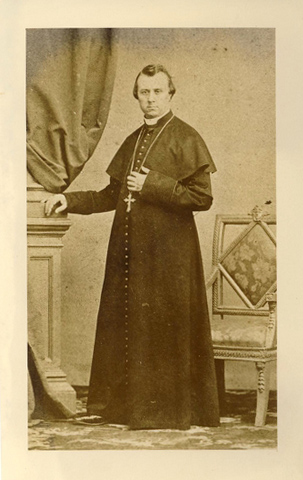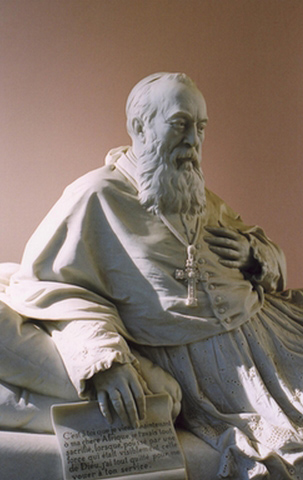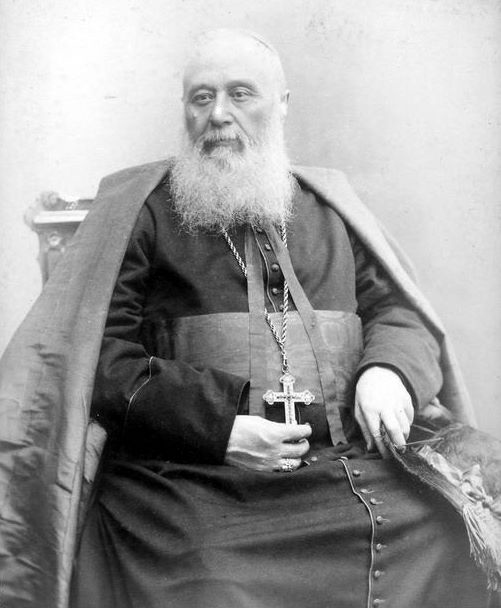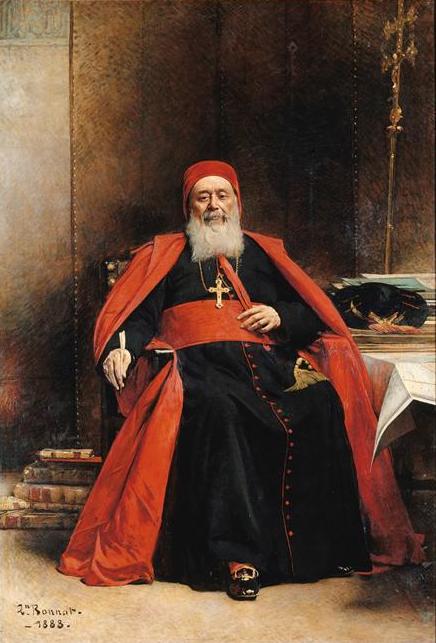Our ancestor
A visionary listening to the African world

Charles Lavigerie (1825-1892)
He was a great leader of his time, known from Malta to Poland, passing through Rome, England, Belgium, Switzerland, Germany, Austria and Italy, then Brazil, the United States and Canada, where he had correspondents and benefactors for the question dealing with his campaign against African slavery and the missions in Central Africa (Sahara, French Sudan, and the Great Lakes).
Born in France, gifted with a great intelligence and a solid faith, he followed a brilliant ecclesiastical career. He taught Church History at the Sorbonne, in Paris, he became Director of a Pontifical Agency helping the Christian populations of the Middle-East. (He met the Algerian Sultan Abd El Kader), then he became a French Diplomat in Rome, and Bishop of the diocese of Nancy…
In 1867, with the Pope’s approval, Lavigerie accepted the offer made to him by the French Government to become the Archbishop of Algiers. Soon after his arrival in that great city of North Africa, his interest went beyond the pastoral care of the Christians who lived in the French colony (since 1835).
Lavigerie used all his capacities of organizer (they were enormous) to come to the help of orphans, victims of a famine which decimated the people of Algeria. To do this, he called upon men and women to learn Arabic, and dressed like the Arabs and the Kabyles, ate their food and lived in the way of the Arabs of the time.
Archbishop of Algiers, Lavigerie with an orphan rescued from the famine. The clothes of the youth show how the first “White Fathers” wore the usual costume of the Algerians of the 19th century, the “gandoura” (tunic) the “burnous” (cape) and the “chechia” (woolen red bonnet). Lavigerie was 45.
Thus, was founded the two institutes, soon nicknamed “the White Fathers” and “the White Sisters”, (on account of their Algerian white tunics). With the development of the missions in Africa, south of the Sahara, (Black Africa), both Institutes will take the name of Society of Missionaries of Africa (MAfr) and Congregation of Missionary Sisters of our Lady of Africa (SMNDA).
Made Cardinal by Pope Leo XIII and appointed Primate of Africa, Lavigerie had his picture painted by Leon Bonnat, an artist who made the pictures of many VIP of that time. The painting, owned by the French State, is on display at the National Museum of the Chateau de Versailles, France. Lavigerie was then 63 years of age. (The painting was made in 1888).

Pope Leo XIII who considered him a brother, appointed him Cardinal of the Roman Church and Primate of Africa, on the seat of Saint Cyprian, in Carthage, Tunisia.
Through his examples and words, he taught us to go and meet the African believers of Islamic faith, those belonging to the traditional religions, “in the way of Jesus” as far as we know, taking our inspiration in the Bible and the Gospels.
First in Carthage, Tunisia, then moved to Rome, Italy. After his death (November 26, 1892) the fame of Lavigerie amplified insofar as the historians studied his active participation in the current events of his time. In the world, through his struggle against slavery; in France, through his rallying of the Catholics to the French Republic; in the Church, among other things, as being one of the sponsors and an outstanding organiser of the Catholic Missions in Central Africa, as well as trying to reanimate the North African Church of the martyrs such as Cyprian, Perpetua and Felicity, Monica and Augustin

Death of Cardinal (Michel Carbonneau)
119 years ago, Cardinal Lavigerie
November 26, Anniversary of the death of Cardinal Charles Lavigerie (1825-1892), Archbishop of Algiers and Carthage, Primate of Africa, Founder of the Society of Missionaries of Africa made of priests and brothers (White Fathers) and of the Congregation of Missionary Sisters of Our Lady of Africa (White Sisters). It is a tradition to remember our Founder on that day in all our missionary communities. In Rome, it is Father Michel Carbonneau, born in Levis, who celebrated the memorial during a Mass service on November 26. Father Carbonneau is the Secretary General of our Society and works in Rome, with our Superior General, Father Richard Baawobr. The painting of the Cardinal, wearing the habit and the bonnet of a Prince of the Church, is the work of the painter Leon Bonnat, in 1888. Lavigerie used to live in a very simple way, yet took great care of his public figure with the idea that he was showing the grandeur of the Church and of the Christian Faith. He wanted to be represented with a writing feather in his hand, and his written works at his side. He is seated near a table close to a geographical map. He was interested by the recent discoveries over the continent of Africa where the first White Fathers worked since 1878, ten years after their foundation in Algiers in 1868.
Michel Carbonneau
Rome November 26, 2011
On November 26, 1892, Cardinal Lavigerie passed away in his episcopal residence of St-Eugene, in Algiers. He was 67 years of age. No doubt that the numerous struggles that he had fought, had undermined his health, particularly his campaign against slavery and the Rallying for the Republic in France. He had become more and more paralysed. Following a flu and a bronchitis, he received the Sacrament of the sick. Beside his last months of a long agony, he revealed his resignation and courage. He spent most of his time in prayers and in surrender to the will of God.
It is worth mentioning that the question of the slave trade is foremost in the mind of the Archbishop of Algiers, until his last breath. Times had changed since his last appeal in 1888 in favour of the abolition of slavery. Lavigerie foresees that sooner or later his missionaries will be involved in liberating the slaves: it is the main subject of his last letter written on November 23, 3 days before his death.
It is also a few days before his death that another question preoccupies the Archbishop of Algiers. It is the question of the Oriental Churches. In Jerusalem, a Eucharistic Congress is in preparation, set for the following year. For Lavigerie, this event should not be reduced to a fleeting liturgical celebration. The Congress must stimulate the will to go further in fostering the union of the Churches. On November 23, he gives to Father Michel, one of his White Father missionaries stationed in Jerusalem, an envelope containing 1,000 francs for the Organising committee of the Eucharistic Congress. He still has the strength to explain his gesture: “I have started my apostolic career in the East, and I also want to spend my last days, at the service of the communion between the Eastern and the Western Churches”.
Close to his death bed, were the representatives of all his various commitments in Africa: among others, Bishop Livinhac and Father Michel from Jerusalem, Father Delattre and Father Bombard, from Carthage and Tunis, Mother Salomé, Superior General of the Missionary Sisters of Africa, Father Buffet, Superior of the Jesuits in Algiers, beside his private secretary and his doctor. He passed away during the night.

His death, immediately known in France, and then throughout the whole world, took the proportion of a national and a universal mourning. Pope Leo XIII, when learning this sad news, lifted up his hands toward heaven and saw it as a loss for the Church in this great man. He said: “I feel a great loss. Cardinal Lavigerie was more like a brother to me, just like Peter the Apostle loved his brother Andrew.”
In his last will, after recalling his obedience and devotedness to the Pope, Lavigerie repeated his love for Africa. He wrote this: “It is to you, my dear Africa, that I turn again. I sacrificed everything, some 17 years ago, when I left everything to give myself for your service. Once again, I express my hope in seeing a portion of this great Continent coming back to the Christian Faith. It is a work for which I have consecrated my life”.
What more can we say of our Founder, this outstanding man called Charles Lavigerie?
We can say that from the beginning, he imposes himself through his exceptional dimension. He has a passionate temperament: a passion about man, a passion about God. He is endowed with a remarkable capacity to work and he can deal with many important undertakings at the same time.
He has a strong character, sometimes excessive in his reactions. Very often he disconcerts and at times he hurts the persons to whom he is speaking, by his way of making an impression. And then, he would express his disagreement with a hurtful sharpness. Afterward, he would become aware of it, and excuse himself.
The Cardinal was a great “leader” of men. He would hire them wherever he found them fit to be at his service, and once with him, he would lead them irresistibly. He would use them as tools, as long as they could serve, and then would get rid of them when they became obsolete. It explains why he had so many secretaries. He had warned them before so they knew the one they had to deal with. One of them tells us “When the Cardinal picked me for his private secretary, he told me “My child, love me as a son, and I will love you as a Father; however, I warn you! As it is said in the Gospel: “I am an austere man, I reap where I haven’t sown, and I pick up what I have not planted.”
It had become very hard for certain persons to see through this imposing personality a hearty man and a man of Faith. Yet this is the major and fundamental size of Charles Lavigerie. He has within himself an unlimited capacity to love, as found in his motto: “Caritas” and in his attitude towards the orphans, and his affectionate touch in his letters to his missionaries and friends.
It is true, he was authoritarian, sometimes in an excessive manner, but then he would pull himself together and ask for forgiveness. One of his servants, newly employed, tells the story about the time the Cardinal scorned him very strongly and sent him away. Then this servant learned that the Cardinal was asking, in a secret manner, how I was dealing with this. The servant continues: «Then when the test had lasted long enough, the Cardinal himself came to see me, and put his red cap on my head saying: My dear friend, if the purple was given to humility, you would certainly wear it”.
He was a man of Faith. It is expressed through his acceptance of the seat of Algiers and the missionary spirit he already had. However, it is found above all in his teachings and his advices to his missionaries. In his mind, the Mission was fundamentally a spiritual work that required an involvement equally spiritual, without half-measures. Thus, he would speak about prayer, the gift of oneself, the love of people and the respect due to others, with the tenderness of God.
Bishop Lavigerie was a good man, a hearty man. His fits of anger were soon followed by confusions, repents and excuses. The Cardinal’s preferences were for the ordinary people. At Marsa, he used to employ a certain number of Muslim workers. Very often he would go and visit them. He would then sit over a hugged root of a big olive tree, letting the people joyfully to get close to him. He would greet them in Arabic, questioned them about their daily businesses and spoke about God. From time to time, he would cook a mutton. Never an Arab who would have complained about his miseries, returned without a help proportioned to his needs.

Finally, another characteristic that his close collaborators knew very well, in spite of the fact that he would scarcely show it in public, it is his cheerfulness and his sense of humour. For example, in a letter that he sent to an old friend, Canon Gatheron of Algiers, himself suffering of the gout, he wrote this:
“My dear and old wreckage, you will excuse me if I dictate this letter, being myself an old wreckage like you: the only difference being that the gout has taken hold of my hand, and yourself the foot. Therefore, we are not any better each other. And the good Lord warns us each day, by demolishing us piece by piece; that the moment is not far when our poor shack will crumble. Let us try to finish well, my dear friend, without the illusion that what we could have accomplished in the past was done most of the time in the wrong way…!”
There also this little story: Bishop Lavigerie having been Archbishop of Algiers for a long time, was walking, one day, on the platform of a train station in France, without showing any apparent sign of his “episcopal dignity”. A priest waiting for the train, came to him and asked him:” Excuse me, Father, you must be a missionary, isn’t it? … Because you have a beard”.
“True, I am a missionary”, said the Cardinal. The priest continued: “Where are you working, if it is not indiscreet?” – “Not at all, replied the Cardinal, I am working in Algeria”. Then the priest said: “Oh, you are in Algeria. Then you must know my former Bishop Mgr. Lavigerie, since I come from Nancy?” Lavigerie then replied: “Of course, I know him, I see him occasionally”. The priest continued: “Is he still awkward?”. “Father”, said the Cardinal, “He is worse than ever, since the sun of Africa has hit him on the head!”.
Another day the Cardinal was passing through Naples. Soon a crowd gathers around him asking themselves who might be this Cardinal. Someone said: “He is the Cardinal from Africa!” And Bishop Lavigerie replies: “It is true, my dear friends, I am the Cardinal from Carthage”. Then someone asks: “What on earth can he do over there?”. And with his usual cheerfulness the Cardinal replied: “Listen to me. There are many categories of Cardinals in the Church. First there are the perfect ones, the first-class ones, those worthier than the others, those are appointed by the Pope archbishop of Naples. And then continued Mgr. Lavigerie, after the excellent ones, there are the good ones, and they are many. These are kept by the Pope to take their advice and govern the Church. Finally, the less worthy ones. Do you have any idea what the Pope does with them? Well, he throws them over the sea and sends them in Africa to punish them”. Then the crowd looked at him and had pity on him. Il povero; il poveretto. And they enquired about how long his time of penalty will last and when he will come out.
In conclusion, I would add this: Cardinal Lavigerie is not remembered on account of his works, but also for his great intuitions up to this day.
At a time when the African churches play a more and more important role in the universal Church, the Cardinal reminds us that deeper evangelisation of Africa must be done by the Africans themselves
NB: This allocution was given during a Eucharistic celebration on November 26, 2011, on the occasion of the anniversary of the death of Cardinal Lavigerie. It is largely inspired by the following books:(1) Xavier de Montclos, Le cardinal Lavigerie, Le Cerf 1991; (2) Jean-Claude Ceillier, Histoire des Missionnaires d’Afrique (Pères Blancs). De la fondation par Mgr Lavigerie à la mort du fondateur (1868-1892), Karthala, 2008 ; (3) François Renault, Le cardinal Lavigerie, 1825-1892, L’Église, l’Afrique et la France, Fayard 1992 ; (4) Mgr Baunard, Le cardinal Lavigerie, Paris 1922, tome II ; (5) Abbé Félix Klein, Le cardinal Lavigerie et ses œuvres d’Afrique, A. Mame et Fils, éditeurs, 1897.
Michel Carbonneau
@Les Missionnaires
